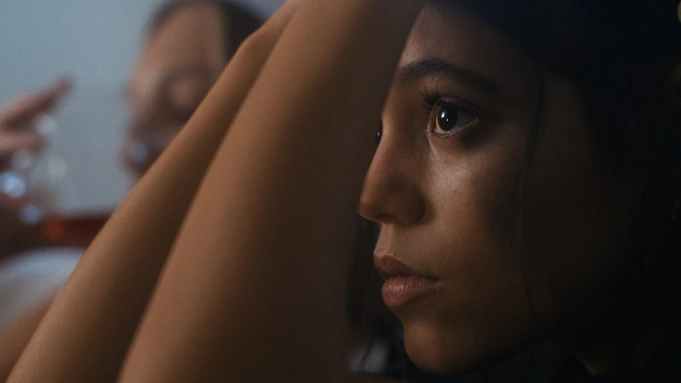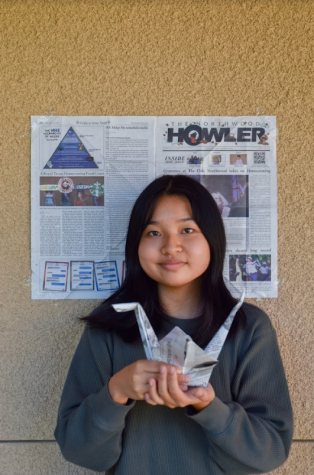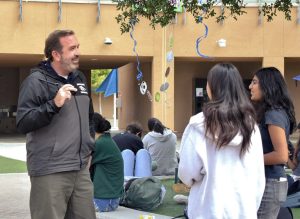‘The Fallout’: Teen Coming-of-Age amidst tragic gun violence
March 11, 2022
A lack of resolution in society is often more prominent than actual resolution, and writer and director of “The Fallout” Megan Park’s debut in the world of cinematography emulates this principle through her dive into the intricacy of trauma and recovery, centering on the 21st century gun violence epidemic. Despite its flaws, the film does relatively well in portraying the effects on a tightly-knit community following a school shooting and the characters’ journeys of tackling grief.
The film’s 16-year-old protagonist Vada Cavell (Jenna Ortega) begins a seemingly normal day of school, catching a ride with her best friend Nick Feinstein (Will Ropp) and getting Starbucks along the way. Later that day, Vada encounters social media influencer and dancer Mia Reed (Maddie Ziegler) when the first shots are fired. The two seek refuge in a bathroom stall together with a bloodied classmate, Quinton Hasland (Niles Fitch), who loses his brother that day, causing Vada to develop a unique bond with Hasland and Reed over their shared experiences. Nick turns to activism, which creates a rift between him and Vada as she can’t find the strength to do the same. As Vada grapples with a new-found reality, the film explores the themes of survivor’s guilt, self-deprecation and isolation, among many others.
What Park does best is her ability to capture the emotion of intense scenes, accompanied with scenic mountain shots and topped off with eight time Grammy Award winner Finneas Occonell’s moving soundtrack. The cinematography perfectly matches and enhances the whirlwind of emotions that Vada feels.
Ortega also perfectly captures her role of a rebellious yet traumatized teen. With a side of dry humor, Vada truly comes to life as Ortega solidifies yet another grounding performance. Lumi Pollack’s portrayal of Vada’s younger sister Amelia also allows viewers to explore the inevitable pull between youthful ignorance and the desire to know what you cannot understand.
Unfortunately, the 96-minute runtime leaves relationships between main characters with more development to be desired. Especially with Mia and Vada, as their friendship spirals into a momentarily romantic one, the movie develops into one of slow-burn in which the complexity of the two’s relationship is never fully explored. Their core conflict of ruining their friendship with romance is resolved with a cryptic text and the plot simply moves on. While their situations contrast each other, from Mia’s absent parents to Vada’s resentment of her parents’ worries, with surface-level dialogue, Mia’s character often falls short of a satisfying foil to Vada.
However, the film hits the mark on the conflict between Nick and Vada over his activism, where Vada feels as if there’s something wrong with her being unable to speak out and tackle the issue at face value like him; drawing important lessons that every survivor’s road to recovery is different. As Vada clashes with her parents over her reluctance to return to school, the film also touches on ever-so-familiar parental insensitivity but also how survivors can often be dismissive of their own feelings.
A potential target for criticism is Vada’s stereotypical millennial therapist Anna (Shailene Woodley), who portrays therapy as a magic solution that will cure her instantly. The show’s choice to include the topic of therapy was laudable, but the topic was included in an unreasonable and potentially inaccurate light.
While the abrupt ending with Vada panicking over a notification of another school shooting nearby is often criticized, the scene nevertheless does well in portraying the persistent and erratic nature of gun violence in the United States.
As gun violence today is debated as a political topic but is never truly addressed, “The Fallout” is still a worthy watch as it sheds awareness on how gun violence is an issue that needs action beyond thoughts and prayers.



![AAAAAND ANOTHER THING: [CENSORED] [REDACTED] [BABY SCREAMING] [SIRENS] [SILENCE].](https://thehowleronline.org/wp-content/uploads/2025/06/lucy-1200x800.jpg)





















































![AAAAAND ANOTHER THING: [CENSORED] [REDACTED] [BABY SCREAMING] [SIRENS] [SILENCE].](https://thehowleronline.org/wp-content/uploads/2025/06/lucy-300x200.jpg)